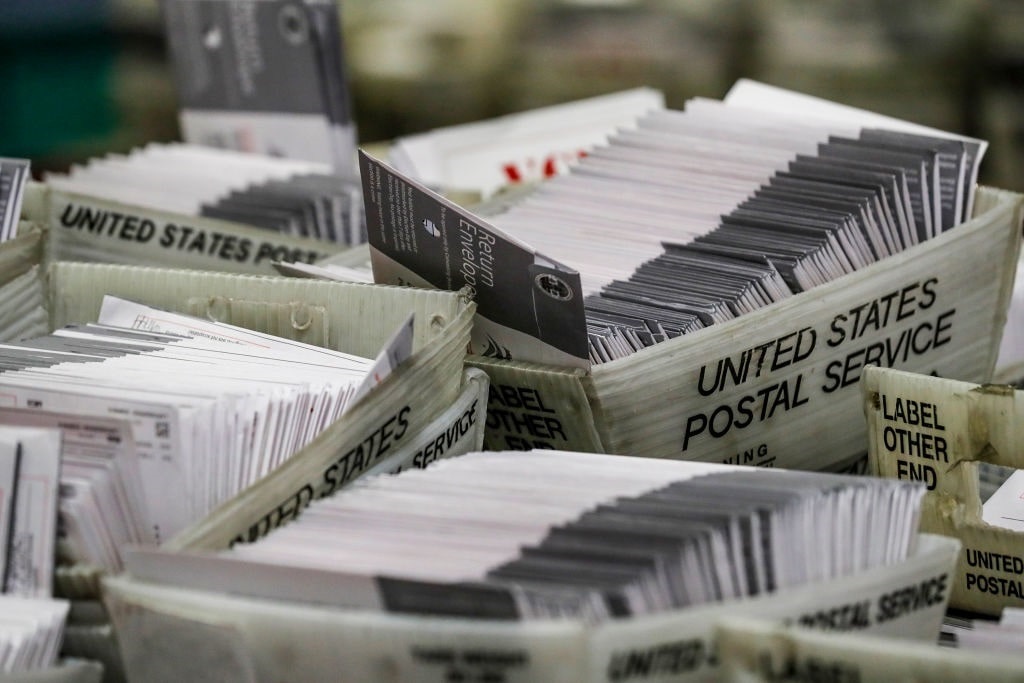Another hybrid election to confuse the masses.
It’s primary time in Michigan, and – just like Nevada’s earlier this month – the Great Lakes State’s contest may be a bit confusing this year. Tuesday, February 27 is primary day for both the Democrats and Republicans – but wait, there’s more! The GOP will also hold a caucus on March 2. And that’s just the beginning of the changes to election laws in this crucial swing state.
A Hybrid State of Mind
Michigan Governor Gretchen Whitmer, a Democrat, signed a bevy of election laws and an executive directive over the last two years, and the people voted in favor of a constitutional amendment. Of all the changes though, the biggest is probably the primary/caucus hybrid system. Just as Nevada did almost a month ago, Michigan will now hold statewide primaries for both parties – as required by and controlled by state law. These used to occur in March, but the date was bumped up. Henceforth, the primaries will be held on February 27.

But state and national Republican Party officials want a caucus under party control rather than a primary run by the Whitmer administration. And so, on Saturday, March 2, the Michigan GOP will hold a caucus. However, unlike Nevada’s “beauty contest,” as Liberty Nation’s Tim Donner called it, Michigan’s primary isn’t pointless. On Tuesday, 16 of the state’s 55 GOP delegates will be awarded to the winner of the Republican primary. The other 39 – about 70% – will be allocated by the party caucus on Saturday.
Vote Early, Vote Easy, Vote Anywhere!
The legislature passed, and Governor Whitmer signed, ten new bills altering the election process in Michigan in 2023. Senate Bill 13 moved the state presidential primary to February. Senate Bill 367 requires at least nine days of early voting. It also authorizes the early tabulation of absentee ballots, though House Bill 4696 makes disclosing the election results from an early voting site before Election Day a Class E felony that could lead to as long as five years in prison.

(Robert Gauthier/Los Angeles Times via Getty Images)
On the topic of absentee ballots, House Bill 4699 establishes a permanent absentee voter list. Michigan residents can fill out a single application to vote by mail and have a ballot mailed to them automatically in all future elections. Senate Bill 259 ensures that all absentee ballots from military and overseas voters are counted even if they’re received up to six days after the election. House Bill 4697 requires at least one secure drop box for every 15,000 registered voters in a municipality (with a minimum of one for the less populated areas), and they must be accessible 24 hours a day beginning 40 days before the election and running through 8 p.m. Election Day. Should absentee voters make mistakes that would normally cause ballots to be trashed, Senate Bill 370 allows them to be corrected. It also requires all absentee ballots to include prepaid postage and envelopes.
Governor Whitmer signed executive directive 2022-04 in May of 2022, instructing all state departments and agencies to “identify and assess potential opportunities when engaging with Michiganders from all walks of life and all 83 counties to help eligible voters register” to vote. House Bill 4702 increased the maximum size of an election precinct from 2,999 registered electors to 5,000, and Senate Bill 373 expanded the type of ID that can be used when registering or when voting in person. Michiganders can now show a driver’s license, passport, tribal photo ID, military ID, or student ID. Confusing? Don’t worry – Senate Bill 339 will establish a website for voters to track their ballots that will notify people when their votes are received and counted or if there are any errors to correct.
A Matter of Constitution
Back in 2022, the people of Michigan voted on Proposal 2, which amended the state’s constitution to, as state Representative Erin Byrnes (D) put it, “create generational change for Michigan voters.” As it appeared on the November 2022 ballot, the Proposal 2 amendment would:
- Recognize the fundamental right to vote without harassing conduct;
- Require military or overseas ballots be counted if postmarked by election day;
- Provide voter right to verify identity with photo ID or signed statement;
- Provide voter right to single application to vote absentee in all elections;
- Require state-funded absentee-ballot drop boxes and postage for absentee applications and ballots;
- Provide that only election officials may conduct post-election audits;
- Require nine days of early in-person voting;
- Allow donations to fund elections, which must be disclosed;
- Require canvass boards certify election results based only on the official records of votes cast.
The laws passed over the year that followed accomplished many of these now-constitutional requirements and more. But state laws can change as governors and legislative majorities shift. A constitutional amendment in Michigan requires two-thirds of each house of the legislature, then approval by a majority of the voters.
A Modified Michigan in 2024
The 2024 election is the first since all these changes took place, so the process will be quite different from 2020 or even the 2022 midterms. From now on, there will be a minimum of nine days of in-person voting – and up to 40 days of early absentee voting – leading up to each election. For this primary, voters began casting ballots in person on Saturday, February 17 and will wrap up by 8 p.m. local time on Tuesday, February 27. Michiganders of any affiliation can – and should – check their registration status with the Michigan Secretary of State’s office.

